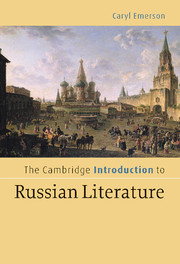Book contents
- Frontmatter
- Contents
- List of illustrations
- Acknowledgments
- Introduction
- 1 Critical models, committed readers, and three Russian Ideas
- 2 Heroes and their plots
- 3 Traditional narratives
- 4 Western eyes on Russian realities: the eighteenth century
- 5 The astonishing nineteenth century: Romanticisms
- 6 Realisms: Dostoevsky, Tolstoy, Chekhov
- 7 Symbolist and Modernist world-building: three cities, three novels, and the Devil
- 8 The Stalin years: socialist realism, anti-fascist fairy tales, wilderness
- 9 Coming to terms and seeking new terms: from the first Thaw (1956) to the end of the millennium
- Notes
- Glossary
- Guide to further reading
- Index
Introduction
Published online by Cambridge University Press: 05 June 2012
- Frontmatter
- Contents
- List of illustrations
- Acknowledgments
- Introduction
- 1 Critical models, committed readers, and three Russian Ideas
- 2 Heroes and their plots
- 3 Traditional narratives
- 4 Western eyes on Russian realities: the eighteenth century
- 5 The astonishing nineteenth century: Romanticisms
- 6 Realisms: Dostoevsky, Tolstoy, Chekhov
- 7 Symbolist and Modernist world-building: three cities, three novels, and the Devil
- 8 The Stalin years: socialist realism, anti-fascist fairy tales, wilderness
- 9 Coming to terms and seeking new terms: from the first Thaw (1956) to the end of the millennium
- Notes
- Glossary
- Guide to further reading
- Index
Summary
Russian literature is compact, intensely self-reflexive, and always about to forget that it is merely made up out of words. Imagined characters walk out of fiction into real life, while real-life writers are raised to the status of myth. Myths consolidated first around saints, then around cities (St. Petersburg and Moscow), then around biographies of writers, finally around ethical and ideological systems. When measured against the subcontinents – Europe and Asia proper – that flank Russia to the west, south, and east, this tradition is remarkable in two respects: its extreme brevity, and its lateness. Chinese literature is calibrated in millennia. Masterpieces in Arabic date from the fifth century. Dante wrote his Commedia in the early fourteenth century and Shakespeare his unparalleled English works at the end of the sixteenth. But Russia as a literary nation entered into consciousness (her own, and the world's) only two hundred years ago.
From that point on, the rise was unprecedentedly swift. Within two decades, from 1815 to the end of the 1820s, two paradigm-shifting events came to pass that provided prime binding material for national myth: Russia's most perfect military victory (the expulsion of Napoleon, from 1812–15) and the maturity of her most perfect poet, Aleksandr Pushkin (1799–1837). These achievements were not the crowning peaks of a national history but its beginning, and they shaped the public face of modern Russia and of Russian literature.
- Type
- Chapter
- Information
- The Cambridge Introduction to Russian Literature , pp. 1 - 10Publisher: Cambridge University PressPrint publication year: 2008



